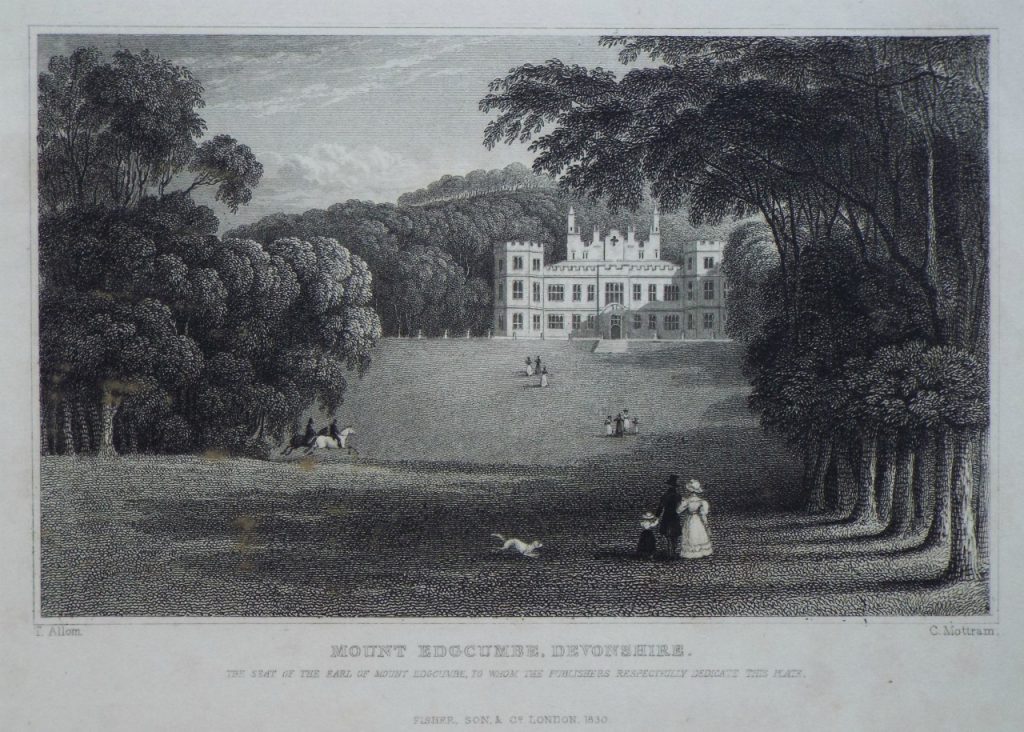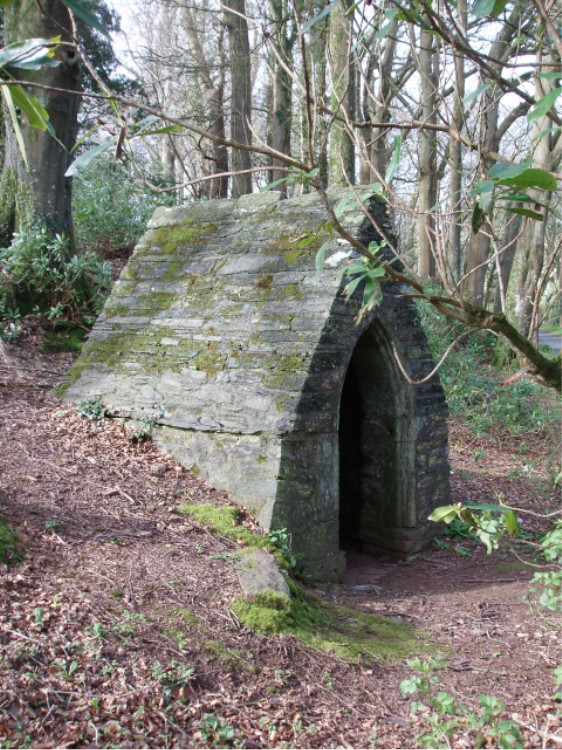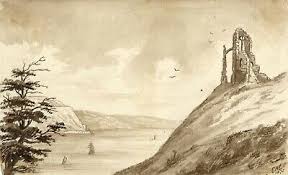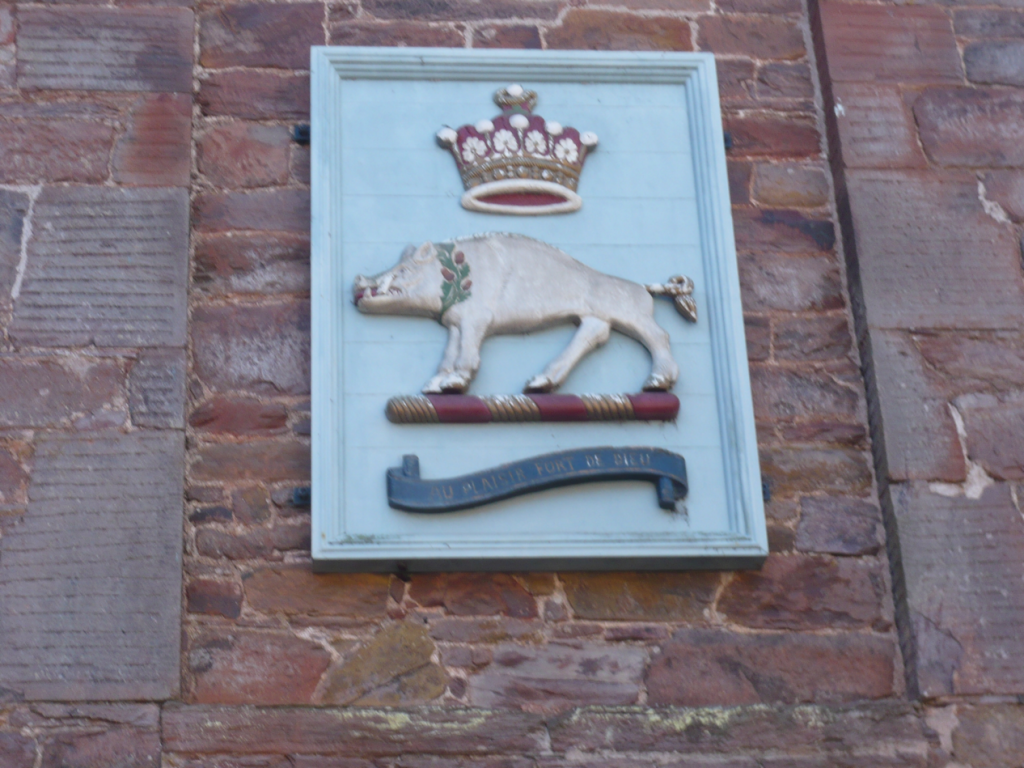

Artist: Thomas Allom, Engraver: C Mottram, Publisher: Fisher, Son & Co, London 1830
Old Mount Edgcumbe House
The setting for the
Tale of the Lady of Mount Edgcumbe’s Ring
The Lady of Mount Edgcumbe’s Ring; A Fruit Thief makes a Fatal Choice!
A storm had passed over Rame!
The chapel stood proud on its summit.
There was now only a calm and eerie silence where waves had lashed the shore. Where the packs of white-backed ‘sea-hounds’ and ‘sea horses’, the tonkynwyn and marg-moriskays, had leapt at the shale-flecked, slate-hard cliffs only to fall back, again and again. Now flotsam and jetsam were left stranded on the beach; sea-kelp and wrack-weed littered the shore or went bobbing about with the gentler lapping of the waves; advancing, receding, meandering across the golden strands.
Swish, Swash, Swizzle, went the rippling waves.
The old fisherman had been ‘beach-combing’ at Polhaun.
He found a child alone, abandoned on the shore, below the Barton at Rame.
“And who are you my dear?”
The little girl looked up at the clouds racing by, but she was silent.
“You’re not a village ‘cheeld’?”
The child only looked at the waves rolling on to the shore.
“Whatever shall I do with ‘ee’ my dear?”
And not knowing what to do, he took the foundling up the cliff path and over to the Barton, to the old Lady of the Manor; the Earl’s widow.
“And who are you, young lady?” asked the widow of Rame.
“Now come, you must tell me your name!”
But still the mysterious child said nothing.
She looked up, but without smiling, her eyes sparkled like the stars.
“Nothing to say! Well I never.”
“Then you must stay here with me and I’ll take care of you forever,
Or at the very least until you are claimed.
For I’ve no grandchild of my own at home anymore.
Would you like that?”
Silently she gazed about, and her eyes glistened like jewels,
But not a word was uttered.
“Well then that’s settled. You must live here with me, my little jewel.”
And the little girl smiled at last and said: “Julitta!”
“Very well then, I will call you my little Julitta”; said the old lady, smiling too.
“It’s the name of a saint who cares for waifs and strays.”
“Who gives a name the life can claim, so you will be my godchild
And you will be baptized Julitta at Saint Julian’s Well.”

Turning to the old fisherman she said:
“Now, you must go down to the villages and find me a nursemaid and fetch me a dressmaker to dress her and a cordwainer to make her some shoes.”
The old fisherman went down to the villages and found a cobbler in the first, and a dressmaker and a bonnet-maker in the second; but try as he might he could not find a nursemaid, even though he went as far as Millbrook. At last he made his way back to the Barton.
Climbing the hill past Saint Julian’s Holy Well at Maker, he stopped to rest and take a sip of water when he noticed a strange old lady sitting in the hedge.
“How are you my Dear?” Said the old fisherman: “Are you quite well?”
“Well enough, but I could be better. I need a job of work to do and a place to rest my bones, old man.” She said.
“And what kind of work might you do?”
“Why I’ve worked in my time as a nurse and a lady’s maid.”
She replied.
The old fisherman took her at her word:
“Well then I may have just the position for you up at the Barton.”
And the strange old lady smiled and said:
“We’ll see! What is offered in good faith will never be refused.”
When the old fisherman told the Lady of the Manor that he had found a nurse for the young child, not a flighty young ‘flibbertigibbet’, but an older and wiser woman, she was taken on trust.
“Don’t I know you my Dear?” Said the Widow of Rame:
” You seem familiar.”
“Oh no.” Said the nurse. “I have not been here for many a year!”
So Julitta was adopted by the lady and raised by the old nurse.
Although the widow’s son; the Earl, when he discovered, felt it unwise and said angrily:
“A foundling!”
“Waifs and strays can be found anywhere and everywhere, mother! You may come to regret taking in a changeling child the tide has left stranded on Polhaun beach.”
The Earl’s own wife had been ‘taken by the sea’ some years before.
But he was proved wrong, for Julitta lived happily with her nurse and the old lady, until she had grown into a beautiful young girl. At times she could be wild and wilful. Often, she wondered about her parents and why no-one had ever come to claim her. Sometimes as a child she disturbed the house with her high spirits and pranks.
Eventually her godmother became ill. Before she died, she sent the nurse to bring her son to the Barton and made him promise that Julitta would be taken care of and married to a suitor of his choice.
The Earl, who was no longer a young man himself, grudgingly agreed:
“But you know I will not have her betrothed to one of the family, mother!
And she must live here. I shall never abide that child at Edgcumbe House!”
Then the nurse was called to witness the promise that had been made.
“Don’t I know you my dear?” Said the Earl when he met the old nurse, for his eyesight was failing.
“Oh No! I have not been here for many a year!”
Said the Nurse, sadly but smiling.
When the old lady of the manor died the nurse was left in charge of Julitta. She called the girl in and said very strictly:
“Your godfather has agreed to provide for you until you are married. He will choose a suitable husband for you, but you must promise to be a dutiful daughter:
You must never again run barefoot in the Earl’s woods.
You must never steal fruit from the Earl’s garden.
You must never ever enter the Earl’s great house.
You must promise you will never pester the Earl or seek to meet his son.
For if you do, then come what may on your wedding day, or soon thereafter, you will surely die. Or something much worse, for you are no longer an innocent child.”
But Jullitta could not bear to think of such a fate.
“What could be worse than a wedding?” “What curse?” she laughed: “And why?
“Those who know a secret; must know how to keep a secret.”
Was all that the nurse dared reply.
“Well! I don’t care for any of those things.
I’m happy to consent to whatever ‘old grumpy’ wants.”
Julitta, smiling, answered.
The nurse said no more, but she looked troubled:
“It is not just the Earl that demands you keep your promise, but your own fate and good fortune, if you foolishly disobey, you may pay a terrible price, my Girl!”
And she was so severe, that Julitta promised to keep her word.
However, Julitta was still wilful! One day when she had nothing better to do, she remembered the fun she had as a child running barefoot in the park, and so without thinking any more about it, she kicked off her shoes and ran through the woods. When she remembered her promise she thought to herself;
“Fiddlesticks, who is going to know?”
But the forester had glimpsed someone running in the woods and was following the track of broken bracken upon which she had trampled.
Meanwhile Julitta came to the garden and looking over the wall she saw the fruit trees, ripe with cherries and pears and peaches. And even though she remembered her promise, the fruit looked so tempting that she slipped into the garden:
“I won’t be seen by anyone I’m sure.”
She tasted the fruit: ‘Each peach, pear, plum, cherry and apple too’ until her lips were stained red by the juices. Then feeling tired she fell asleep beneath an apple tree.
The gardener, seeing the open gate, came into the garden and immediately noticed the broken branches and following the trail of fruit stones through the trees, he eventually found the fruit thief fast asleep. He could not wake her and so he ran off to fetch the earl’s son, who had just returned home and was even now walking with the forester towards the garden gate. The young earl entered the garden, he looked at the fruit thief and fell instantly and deeply in love with her. He lifted the sleeping Julitta and carried her to the House; the very place she had been forbidden to ever visit.
By now it was evening, and the nurse was out looking for Julitta; eventually she met the forester, who described what had happened in the woods. Then she met the gardener who told her what had happened in the garden. The old lady in great fear ran to the Earl’s house, but it was too late. Julitta had ‘woken up’ and met the young earl, although she had ‘no idea who he was, nor he she. The nurse dragged her from the house back to the Barton at Rame and scolded her for breaking all her promises.
“All except one!” said Julitta,
“For although I entered Edgcumbe, I have not met the old Earl’s son.”
The nurse was tormented by doubt; should she tell Julitta the truth about the young man? Instead she said:
“Promise me Julitta, you will never marry any man the Earl does not approve for you. You must do as he says. He has to visit us to discuss your settlement. You must not mention that you have been to the House. He may even send a carriage up to the Barton for you sometime soon.”
Laughing, Julitta declared:
“I don’t plan to marry anyone at all. I’m happy enough here with you.”
Time passed!
But in her ‘heart’ she remembered the young man she had met in the great house and wished to meet him again.
Now the old Earl had a lazy, surly, sullen servant; the Croggan, who had been a skinner and tanner by trade and as the gardener said:
“Was always to be ‘scented’ before he was ever seen!”
For the scent of death is not so easily washed away.
And he still reeked of the bestial smells of the slaughterhouse and the tannery.
Julitta had always been terrified of him and trembled in fear at the foul smell of dead beasts and old bones, that accompanied him everywhere.
He worked in the stables. He mended the carriage harness; he worked the leather with his sharp knife, with his shears and cord and strong steel needles. His hands were like his heart, coarse and muscular and hardened. The veins and arteries stood up all blue and black, filled with the bad blood that coursed through them. Anyone the old earl favoured he resented; he particularly resented the easy life of Julitta and her nurse.
When the earl told him to repair his mother’s harness and carriage for Julitta, he grumbled and complained that:
“The ‘chit’ of a girl was no better than they once were.”
And he pointed over his shoulder to the cambrel for game, on which dead pheasants and gleanies were hung. He said under his breath:
“We know of that sort! Fine feathers do not a fine bird make.”
He took his time with the harness; so long that before he had the horse and carriage ready, the old earl fell ill and died, leaving Julitta without her guardian or a settlement.
The guardianship now fell to the new earl.
As soon as he called upon his ward, he recognized the fruit thief. He began to court Julitta but try as he might he could not persuade her to marry him. The young woman was haunted by the omen; she feared she would die, as the old nurse foretold. However, when the young earl discovered that Julitta had promised to only marry someone acceptable to the Earl of Mount Edgcumbe, he announced:
“Well I’m now the Earl so I can decree, you will never marry anyone!
Unless you marry me!”
At first, she refused. What could she do? Keep her promise to the old Earl or obey the new?
Eventually, despite the nurse’s warning, she was persuaded to put her ‘silly fears’ aside. She agreed to marry the Earl and a wedding day was set. All went well; guests were invited, the marriage feast was arranged, the church at Maker was decked out with all the flowers of spring to celebrate a May wedding.
But on the wedding’s eve the ‘bride-to-be’ walking back from the church stumbled, fell down on the pathway and immediately went into a deep trance-like sleep.
Try as they might the servants could not wake her, until in desperation they ‘fetched up’ the old nurse, who ran to the saint’s holy well at the nearby chapel of St Julian and collected a jug of water. The nurse forced some drops of water through Julitta’s lips and as she stirred poured the contents of the jug all over her, until she was ‘drenched’.
She ‘came to’ with a start, shivering and shaking:
“O Nurse I’m so ‘mazy’ and drenched quite through,
As if a dark cloak was covering me, a cold hand caressing me.”
“No. No! My child you were only asleep!”
The nurse murmured, but was troubled by what had happened too:
“Tis as foretold.”
She thought, but she told no-one of her fears.
By the next morning, however, Julitta was up like a lark and the marriage ceremony went ahead without a hitch, the bridal feast and toasts to bride and groom were made. Until Jullitta held up her hand, where the great diamond ring of the Edgcumbes now glistened, and the celebrations ended with a hearty cheer for the happy couple.
But on the bridal night, no sooner had the couple retired, than the young wife once again sank into a deep, impenetrable sleep. The distraught groom did everything he could to rouse her, but neither lifting, nor shaking, nor even tickling her toes with a feather had any effect, until the old nurse was called and a servant was again dispatched, running through the night to collect a jug of water from St Julian’s holy well. The Earl forced some drops of the spring water through his wife’s lips and doused her with the remainder and she immediately started, as if she had just come back to life.
“Oh Nurse, I’m so ‘mazy’ and chilled to the marrow of my bone,
As if a dark ocean had drowned me, and I was all alone, trapped in the deep.”
“No. No! My child you were only asleep!”
The Nurse consoled her.
When the couple set off on their honeymoon the next day the Earl was careful to take with him a flask of ‘blest’ spring water from the saint’s holy well. There were no further mishaps, but each night the husband made sure his wife sipped a few drops of the water, just to be on the safe side. The couple returned to Mount Edgcumbe in the mid-summer and by late autumn of the year, it became clear that Lady Mount Edgcumbe was expecting a child.
One day, as the fancy took her, she had a craving for fruit and went back to the garden where there were still a few late pears and apples. She picked several and sat down under the apple tree and took a bite from each. She shivered in the autumn breeze, she trembled and scented danger, but she felt unable to leave and feeling drowsy fell into a deep sleep. By evening she had not returned, and the servants were sent to search the grounds. They found the Lady of Mount Edgcumbe, cold as ice under the apple tree.
They carried her to the house, the earl was called and the old Nursemaid.
They pricked her thumb with a needle, but no blood ran;
They held a mirror close to her lips, but no warm breath clouded it.
The earl ordered the big surly servant to run immediately all the way to the saint’s well, a good mile away, and fetch fresh water from the spring. But the lazy resentful fellow got only as far as the stables, carrying a heavy old clome kitchen jug, when he began to puff and wheeze. He stopped running and started to saunter, until he saw the stable pump by the horse trough. The Croggan scratched his head, sat down on the stable bench, and thought to himself;
‘water from one well is as good as water from another’.
He took out his pipe, had a smoke and strolled over to the horse trough to fill the jug. He didn’t even bother to pump up some fresh water. When he had finished his pipe, he strolled back to the house, running the last few yards, to appear sweaty and exhausted.
The young earl was waiting by the backdoor;
“Hurry up, you lazy lout!” he shouted.
And he grabbed the jug and ran upstairs, where the nurse bathed Julitta’s forehead with water and forced drops between her lips. But all to no avail, for this time she remained as cold as ice. The earl threw the rest of the water over her, but the icy water lay in pools around her on the blue silk sheets, as if it too was freezing.
The surly servant was now fearful, he trembled and said:
“I’ll prick right through the palm of her hand with my darning needle;
That’l wake the hussy!”
But it did not.
Doctors were sent for; they descended, one by one, like some horrid flock; a murmur of curious, black rooks at their nightly gathering. They moved between the silent rooms; muttering and scuttering and fluttering here and there as scavengers do, desperately seeking a remedy, but they could find nothing to break the spell.
Finally, and angrily the earl ordered all to leave and sent instead for his priest and his undertaker. A grand and mournful funeral was held, house and mourners were all robed in black, and Lady Mount Edgcumbe was laid to rest, in her finest dress, wearing her finest jewels in her coffin within the family tomb. The earl sank into a deep dark pool of grief and anger and melancholy, a pool as dark and deep as the Barn Pool below the house. He could not be consoled.
Now the surly servant was too terrified to tell anyone that he had not brought water from the saint’s holy well. Or admit that he had sauntered to the stables and there sat down to smoke his pipe. But it did not matter; the earl was so angry, when he next saw the rude and lazy fellow, he fired him on the spot.
The Croggan went to the local inn; resentment and anger burned within:
“I know what I shall do!
Tonight, I’ll take what’s due, and a bit more too,
From the Lady of Mount Edgcumbe.”

It was almost midnight when he stole back through the woods to the family vault. The moon was riding high and bright in the night sky, with clouds, skimming swiftly across its face, and the wind moaning in the trees. A barn owl hooted in Maker Wood and the hounds in their kennel howled a mournful reply.
The mortar was still moist around the door of the vault and the servant scraped it away easily; he pulled the vault-stone aside. He crawled into the tomb; the darkness felt like a thick, cold cloak covering his flesh. He shivered and shook and lit up his pipe with a taper, so that he could see his way. He crawled forward, finally he stood over the coffin of Julitta. Using his shears and the blade of his knife he levered the top off the coffin and looked down on the pale corpse. At first, he could hardly make a move, until he saw the jewels glistening; he grabbed a silver broach, a necklace of gold and then he saw the diamond ring on the wedding finger of her hand. He grasped the hand, it was icy cold; he tugged, he pulled, he twisted, but the ring would not budge. He wanted to leave, but despite the cold sweat of fear, greed kept him there and eventually he took out his keenest, sharpest knife and grasping the hand, began to cut the ring finger from her body. He cut and cursed and cursed and cut, until it was almost through, when suddenly the cold, deathly hand in his grip now closed and clutched him too. A most terrible cry pierced the tomb and escaped into the woods beyond. Lady Mount Edgcumbe sat up in the coffin holding her own bloody finger.
Now it was the servant’s turn to scream, his eyes opened wide with terror and his eyelids froze to his brow, his hair turned white and stood on end, he dropped his treasure. He ran howling through the woods, haunted by the ‘keening’ scream of the pale lady he had awakened from her deathly trance. He came to the river and he did not stop but dived in and swam off into the night.
The Earl and his servants rushed to the vault to discover Julitta restored to life. She was carried to the warmth and light of the house and never again did she fall into such a trance. Julitta, the fateful spouse lived on and had her child, and so the Earl was presented with a son.
But of the thieving, surly servant; Jago the Croggan, there was never more a trace.
Julitta lived to a ripe old age and had a new finger of bone ivory carved to fit her hand, from the tusk of a wild, white Edgcumbe boar; and that finger still carried the diamond wedding ring until the day she died, when it was once more buried with her.

Footnotes for The Lady of Mount Edgecumbe’s Ring
This story has circulated in the locality for generations and in a number of versions, it is never referred to as just Lady Edgcumbe, but always as the Lady of Mount Edgcumbe’s Ring, with no further explanation of her origin. I have combined this with a local anecdote about an independent but virtuous young Lady; Julianna, or Jullitta and her companion, who were traveling to the ferry at Cremyll and were set upon by robbers and left for dead but revived by water from St Julian’s Holy Well. This well-spring may have been dedicated once to a local Celtic saint before the medieval St Julian the Hospitaler; a later patron of distressed travellers, and there is a Saint Julitta elsewhere in Cornwall. She was a Celtic saint, (known as Llud in Wales) who has a church and well dedication at
Tintagel, being one of the Children of King Brychan, famous in Welsh and Cornish legend. The fairy story; Sleeping Beauty has a number of tale motifs in common with this tale, but she was awakened rather more gently. In none of the local versions is there any explanation of the reason for the lady’s recurrent trance, but the saint’s well or holy spring is sometimes mentioned. In the simplest version the lady has only one death-like trance, but the servant cutting off the finger is common to all.
The motif of a family curse and being buried alive has of course had a recurrent fascination for writers favouring the macabre and the Gothic and hence for the Victorians and Edgar Alan Poe. Film directors from Jean Epstein to Roger Corman and Hammer Horror Studios have not been slow to exploit the legend and the causes of ‘narcolepsy’.
While Freudians and psychological interpretations generally may read a range of meanings from the dream-like elements of the tale.
One of the Edgcumbe shields does indeed have a White Boar, hence the origin of the tusk to replace the severed finger. Using boar’s tusk to replace a missing body part seems to be an ancient folk burial custom, although why I have no idea! Of the rascally servant; Jago the Croggan, there is no trace, (but there are still plenty of Tanners and Skinners in the locality). It has been pointed out to me by a language expert that a Croggan is probably the local dialect form of the Cornish ‘croghen’; a leather worker. Although in another tale it implies some kind of sprite. The deep Barn Pool is still to be found below Edgecumbe House and was used to embark troops and tanks during D-Day.
Walks for visitors
See the Mount Edgcumbe Guide for the main walks in the grounds and gardens. Entrance to the park is free, but parking is not, and entry to the house itself requires a small additional payment. There are good restaurants and shops and other activities located at the Old Stables and the Orangery, so it makes for a great day out.
The house and gardens are well worth the visit and there are several fine coastal walks linked by the old Earl’s Drive to both Kingsand and Cawsand villages and beyond to Penlee Point (a nature reserve) and Rame Head, with its Coastguard Station and Chapel and fine views to the west across Whitsand Bay, formerly Seythin Bay.
There is a very nice stroll from the Edgcumbe Arms pub at Cremyll along the foreshore by Empacombe Redoubt and on to Anderton and Millbrook, more good pubs and local shopping and even some semi-retired hippies, slumbering in the hedgerows.
Do not disturb.
There is also an annual gathering for Fairy Folk who bring their own wigwams with them, while the Green Man makes his appearance at Edgcumbe around May Day.
I ‘kid’ you Not!
Black Prince Day, the local version of ‘Obby Oss Day’, is also celebrated on Rame; it starts in Millbrook and continues through Kingsand and Cawsand on or about the First of May.
Check their calendar of events for details.
Across the River Tamar are the impressive dockyard buildings of the Royal William Yard, also well worth a visit and accessible by boat; the Cremyll Ferry runs a regular service all the year round. The whole peninsula is rich in ‘Defense of the Realm’ Heritage.
If you want to find out more about the Edgcumbe family, a day trip up the River Tamar to Calstock by boat, or by car to Cotehele House, another late Medieval home of the Edgcumbes on the River Tamar, is also essential.
It is a National Trust property and so the usual charges apply.
The Tamar Valley is an Area of Outstanding Natural Beauty and includes parts of the World Heritage Mining Area as well; visits to the Morwellham Mining Centre (although in Devon, another country!), Kit Hill and the Drakewalls Gateway Centre in Cornwall are all recommended.
River trips up the Tamar, apart from special bookings, are normally from Plymouth Barbican, times depend on the local tides.
You could be well occupied here for a whole week!

Thank you for sharing this great story. I wonder if you might be able to help me. I recently came across a poem by a man who visited Mount Edgcumbe in 1859 and he describes another local folktale. I have searched on the internet but have not been able to find out anything about it. The relevant lines of the poem are:
And thou too, Cremil,- Edgecumbe’s [sic] surf beat strand,
Tradition leads from thee to darker day,
The spacious park, the ground our thoughts command
Replete with legend of a blood stained lay.
Within yon murky cave, a site of tears,-
So runs the tale,- put to the unhallowed test,
Would but some might remain for seven long years:
To obliterate the brand from Edgecumbe’s crest:
Wealth, Honour, Rank, Position, were his prize,
No odium more would on the house remain;
Detraction through each future scion dies,
The gory steel no more reflect a stain.
Separately he adds the annotated note:
‘There is a tradition that in Edgecumbe [sic] Park there is a cave constructed by the ancestors of the present Lord; in which if they could persuade any man to remain 7 years without shaving or hair cutting it would be the means of taking from the family crest a Bloodstained Dagger said to be the insignia of some sanguinary act of a scion of the house but which the author puts not the least faith in.’
Of course, the family crest of the Earls of Edgcumbe shows three boars’ heads but no bloody dagger and the author himself puts no faith in the story, but I find it curious that this tale was clearly known in 1859 and considered a ‘tradition’ by that point. It is also interesting that the author shares this story but seemingly knew (or at least shared) nothing about the story of the Lady of Mount Edgcumbe, which is now relatively well-known.
Have you ever heard anything about this other story, or could you suggest anyone I could contact who might? Many thanks.